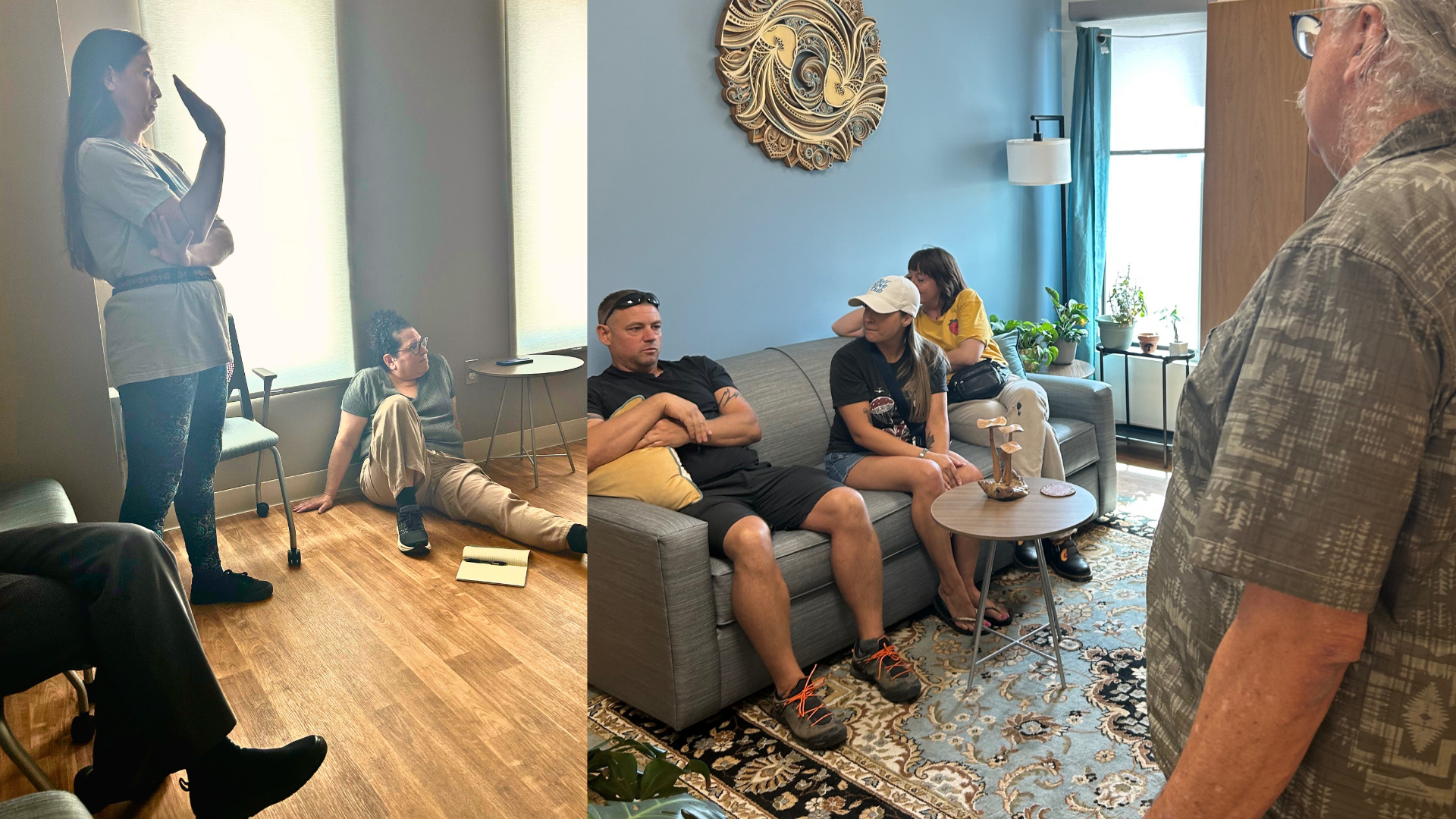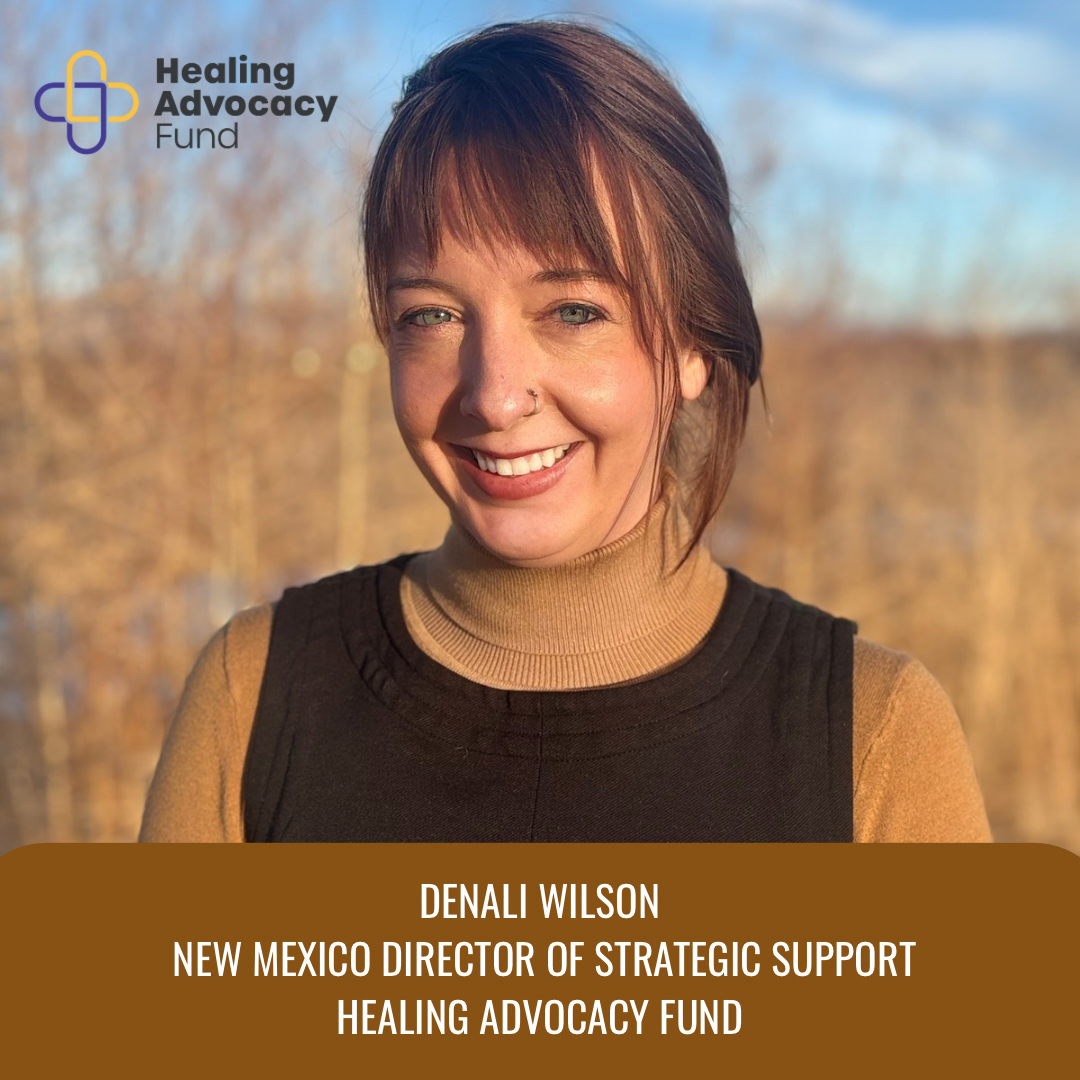Snapshots from PMHA’s New Mexico’s Community Engagement Process
-
We’re now three months away from completing our nine-month community readiness and co-design journey in New Mexico, in preparation for the Group Psilocybin-Assisted Therapy (GPAT) pilot for PTSD with the University of New Mexico. Together with the Bernalillo County Health Equity Council, Indigenous leaders, veterans, clinicians, and community members, we’ve been shaping what an accessible, culturally rooted model of psychedelic care can look like.
-
This spring, we joined a statewide Town Hall celebrating the passage of Senate Bill 219 (New Mexico’s Medical Psilocybin Act), hosted a Community Design Studio, and convened two site visits at the Interdisciplinary Substance Use and Brain Injury (ISUBI) Center on the UNM Health Sciences campus — the facility where the GPAT study will take place — to envision therapeutic set and setting. Along the way, we supported the enrollment of two veterans who will serve as peer navigators in the study through the Elemental Psychedelic Facilitator Training program, and began aligning with peer navigators from the other affinity groups — women survivors of sexual trauma and Indigenous community members — to support their participation in the same training. Two community leaders also completed CITI research certification. Our work has additionally reached more than 1,000 people nationally through presentations at The Enchanted State and Psychedelic Science 2025 (MAPS VirtualTrip).
Testimonials
“This is the first time I’ve seen a research study invite us to co-design from the beginning. It makes me feel like my experience and culture actually matter.” — Indigenous community participant, Design Studio
“Having peers who’ve been through trauma like mine at the table changes everything. It means I won’t be alone in this.” — Veteran participant, Town Hall
“The way you are talking about integration — family, community, not just the individual — that’s what makes this different and necessary.” — Clinician participant, Design Studio
“Even the color of the room matters. Olive green walls might seem neutral, but for veterans it looks like fatigues — it could be triggering. Repainting in a softer tone could make the space safer.” — Veteran peer navigator, Site Visit
Key Insights
Cultural and Spiritual Safety: Engagement affirmed that cultural and spiritual safety must be embedded in all aspects of the study. Indigenous leaders emphasized the importance of incorporating ritual, prayer, and traditional medicine practices as integral to set and setting, not as ancillary considerations.
Central Role of Peer Navigators: Peer navigators emerged as a critical innovation. Community members consistently highlighted the value of trusted peers who can walk alongside participants before, during, and after psilocybin sessions. Their inclusion is expected to strengthen trust, enhance integration, and bridge gaps between formal healthcare and community-based supports.
Facilitator Vetting and Workforce Preparation: The process revealed a heightened demand for careful vetting and expanded training of facilitators. Participants raised questions about who is qualified to hold space, how facilitators’ lived experience should be valued alongside professional credentials, and how health equity can be operationalized in training pipelines.
Integration Extends Beyond the Individual: Integration needs were described not only as individual therapeutic follow-up but as relational and systemic. Family preparation, affinity-based support groups, and connections to local, state, and national resource networks were consistently identified as necessary elements of ongoing care.
-
Launching focus groups and individual interviews with the identified affinity groups — women survivors of sexual trauma, veterans and first responders, Indigenous community members, and traditional healers — to directly inform study design and implementation.
Continuing to enroll and train peer navigators from each affinity group through the Elemental program, building a community-based and identity-aligned care team for the study.
Advancing coalition-building and readiness work so that insights from the GPAT pilot can help shape New Mexico’s statewide medical psilocybin program.
Concluding with a December 2025 workshop where clinicians, peer navigators, and community healers will provide feedback on a prototype Circle of Care Map. This tool is designed to support not only study participants but also the people who stand alongside them at home and in their communities — their home and community care members. The Circle of Care Map will serve as a visual ecosystem of support, mapping and showcasing city, state, and national resources that can sustain participants before, during, and after their experience. It emphasizes ongoing integration and highlights resources across behavioral and mental health, nutritional health, mindfulness and resiliency practices, emotional intelligence and well-being, and social services that stabilize baseline health.
n the first quarter of 2026, we will be compiling and publishing a comprehensive report on our entire community engagement process and sharing it with the broader fields of psychedelic-assisted therapy, mental health, and health equity.
-
Research shows that community-engaged care design leads to more trusted and effective health outcomes, especially for historically excluded populations. As Harvard Public Health puts it:
“When researchers include the people they study in the research process, outcomes improve.” — No research about us without us?, Harvard Public Health
Community-engaged research reminds us that healing is most powerful when it is shaped by the very communities it seeks to serve.
——
If you’re curious and want to know more about our community engagement process, connect with PMHA Alliance Co-Director Hanifa Nayo Washington by emailing her at hanifa@pmhaa.org.
Mile High Impact: PMHA Alliance at Psychedelic Science 2025
PMHA Alliance Co-Directors Hanifa Nayo Washington and Dara Menashi headed to Denver this summer for Psychedelic Science 2025. They were joined on stage by Dr. Larry Leeman (University of New Mexico), Crystal C. Romero (Veteran & Peer Navigator), and Jamus Herrera (Bernalillo County Health Equity Council) for a powerful conversation about how the Group Psilocybin-Assisted Therapy (GPAT) Study for PTSD is taking shape in New Mexico—how it’s being guided by a nine-month community engagement process, and how it will ultimately inform the state's newly approved, legislatively backed medical psychedelic therapy program.
Where the Healing Happens: Site Visit & Heart-storming on Set & Setting
PMHA Alliance and Dr. Larry Leeman’s research team welcomed collaborators to the Interdisciplinary Substance Use and Brain Injury (ISUBI) Center at the University of New Mexico Health Sciences Campus in Albuquerque, NM. This second on-site convening focused on aspects of set and setting for the upcoming Group Psilocybin-Assisted Therapy (GPAT) pilot study for PTSD—bringing together interdisciplinary partners who are actively preparing for its implementation.
The group explored how culturally attuned and resonant design choices—such as art, music, and the physical layout of the study room—can create more supportive therapeutic environments. Discussions also addressed how set and setting considerations will need to vary to meet the distinct needs of the study’s three affinity groups: women survivors of sexual trauma, Indigenous community members, and veterans and first responders.
🔆 An important real-time insight emerged during the session when two military veteran facilitators—who will be supporting the study—pointed out that one of the therapy rooms is painted a deep olive green, a color reminiscent of military fatigues. They noted that this could be triggering or uncomfortable for veteran participants. The conversation led to suggestions for intentional choices in lighting, art, plant life, and soft fabrics that could soften the space and provide a more calming, and healing atmosphere.
Innovative Care Model in Development
The GPAT study for PTSD is slated to begin recruitment in Q1 2026 and dosing in Q2, pending funding. The project is expected to conclude in 2027. It will test a novel, cost-effective care model that integrates both individual and group-format care during preparation, administration, and integration.
Policy and Systems Collaboration
PMHA continues to actively collaborate with the Healing Advocacy Fund to support the New Mexico Department of Health (DOH) in shaping its new state-regulated psychedelic therapy system. This includes advising the department as it establishes the newly formed Advisory Board and helping ensure that the emerging system is accessible, inclusive, and meets the needs of people across income levels.
It has been a profound honor to work with HAF’s newest team member, Denali Wilson, who serves as the New Mexico Director of Strategic Support. Denali brings passion, legal acumen, and deep commitment to justice to this moment of system creation in New Mexico.
The Enchanted State: Limina Foundation Leads a Landmark Gathering
-
On September 7, nearly 800 people from across New Mexico and the country gathered at The Enchanted State—a sold-out, daylong symposium and celebration hosted by the Limina Foundation at the Lensic Theater in Santa Fe. The event spotlighted New Mexico’s vibrant and rapidly evolving psychedelic-assisted therapy and wellness ecosystem, co-created in real time by community members, leaders, and visionaries.
Dr. Larry Leeman, one of the esteemed presenters at the event, invited us into the landscape of his life’s work—grounded in decades of healing alongside Native communities, maternal health, and addiction care. He also uplifted the powerful collaboration between PMHA Alliance and the University of New Mexico, underscoring how this partnership is foundational to the design and development of the upcoming group-format psilocybin-assisted therapy pilot for PTSD. His remarks emphasized the unique community engagement process guiding the study, which is shaping the care model’s culturally attuned set and setting, as well as its integration of ongoing and robust, community-informed tools and support services. His presentation punctuated our shared commitment to building systems of care rooted in dignity, cultural specificity, and real access.
PMHA Alliance is deeply grateful to the Limina Foundation — and especially to Michael and Adele Getty — for their visionary leadership in convening such a timely and needed gathering. We also give thanks and recognition to all of the speakers and community members who have been on the ground building and creating an accessible psychedelic healing and wellness ecosystem in New Mexico.











